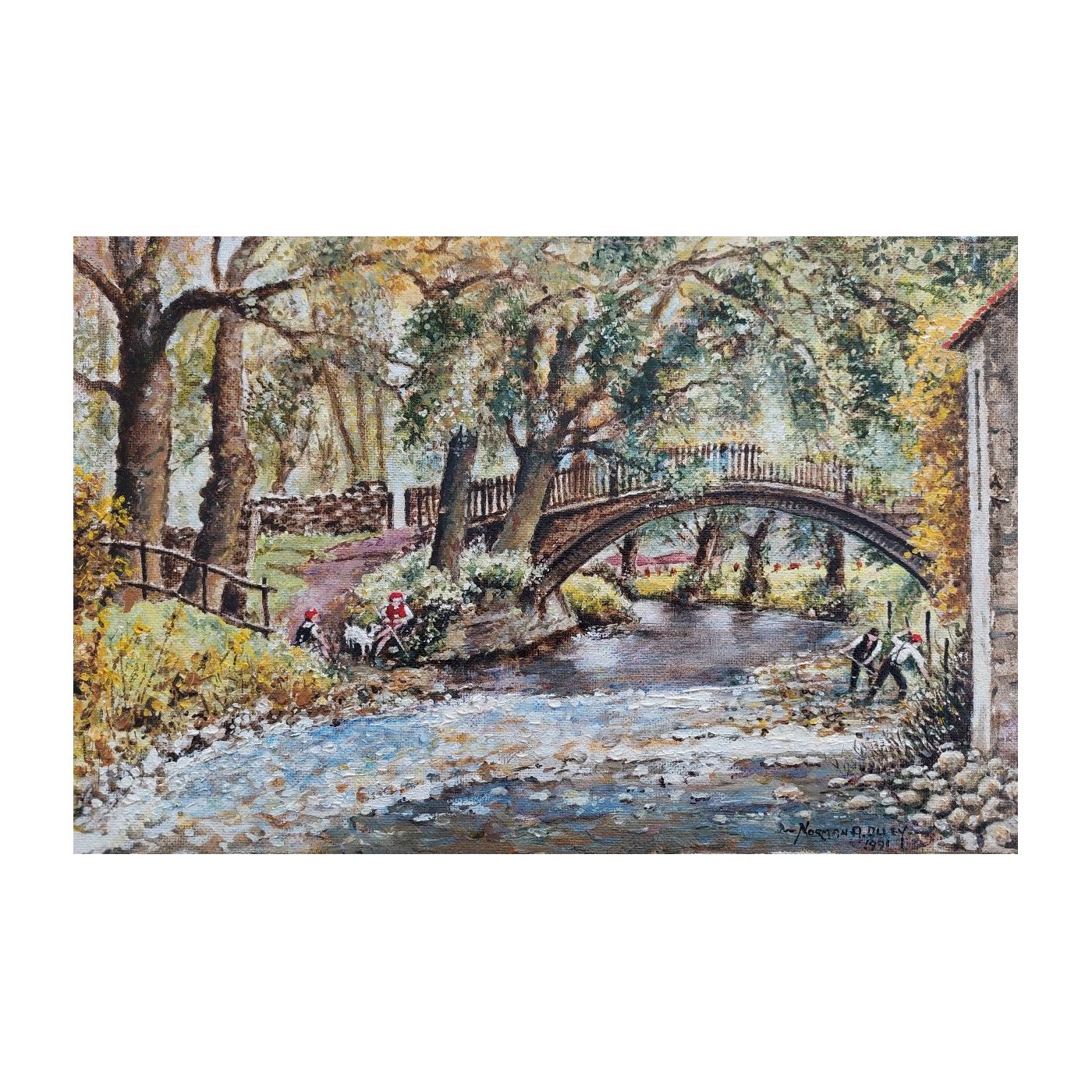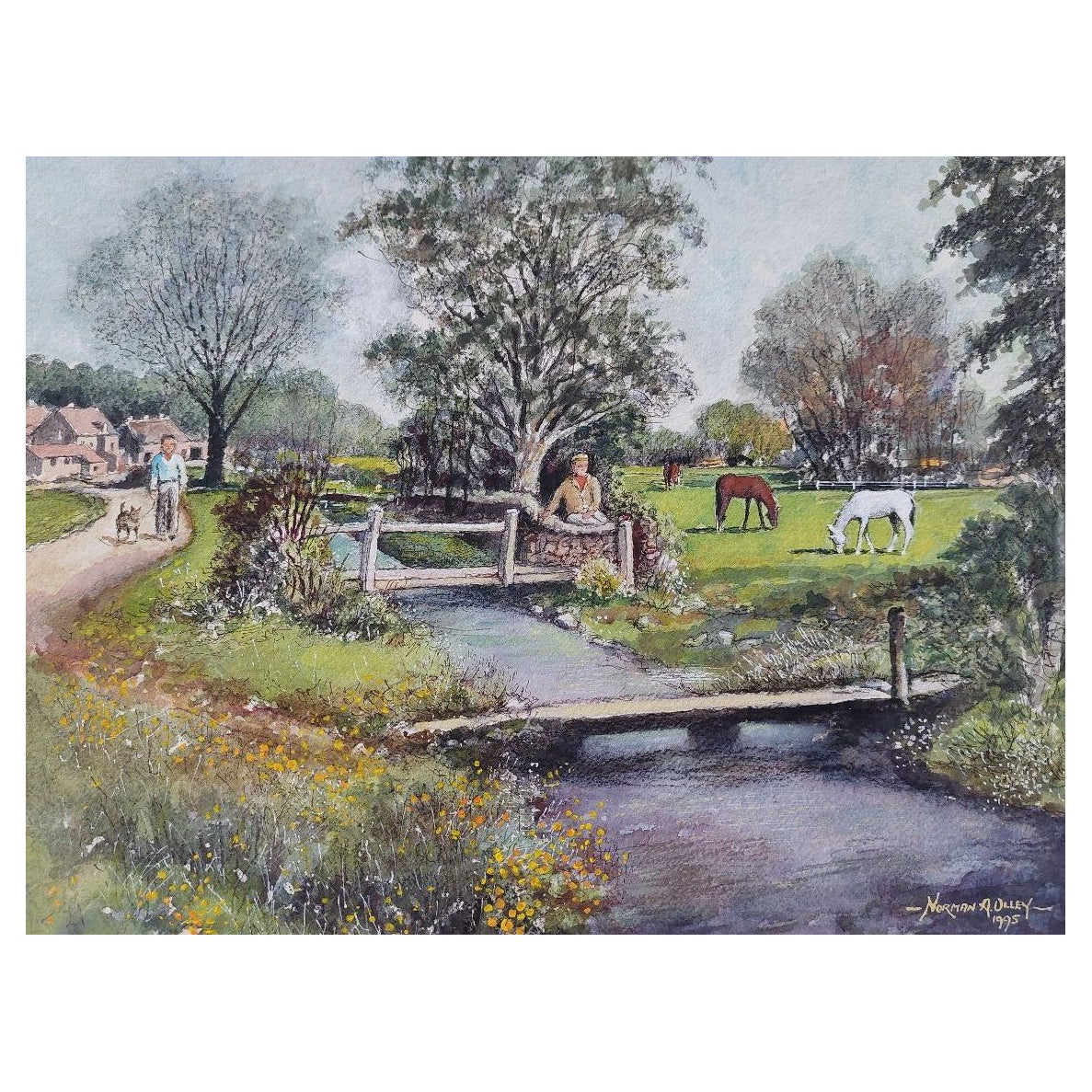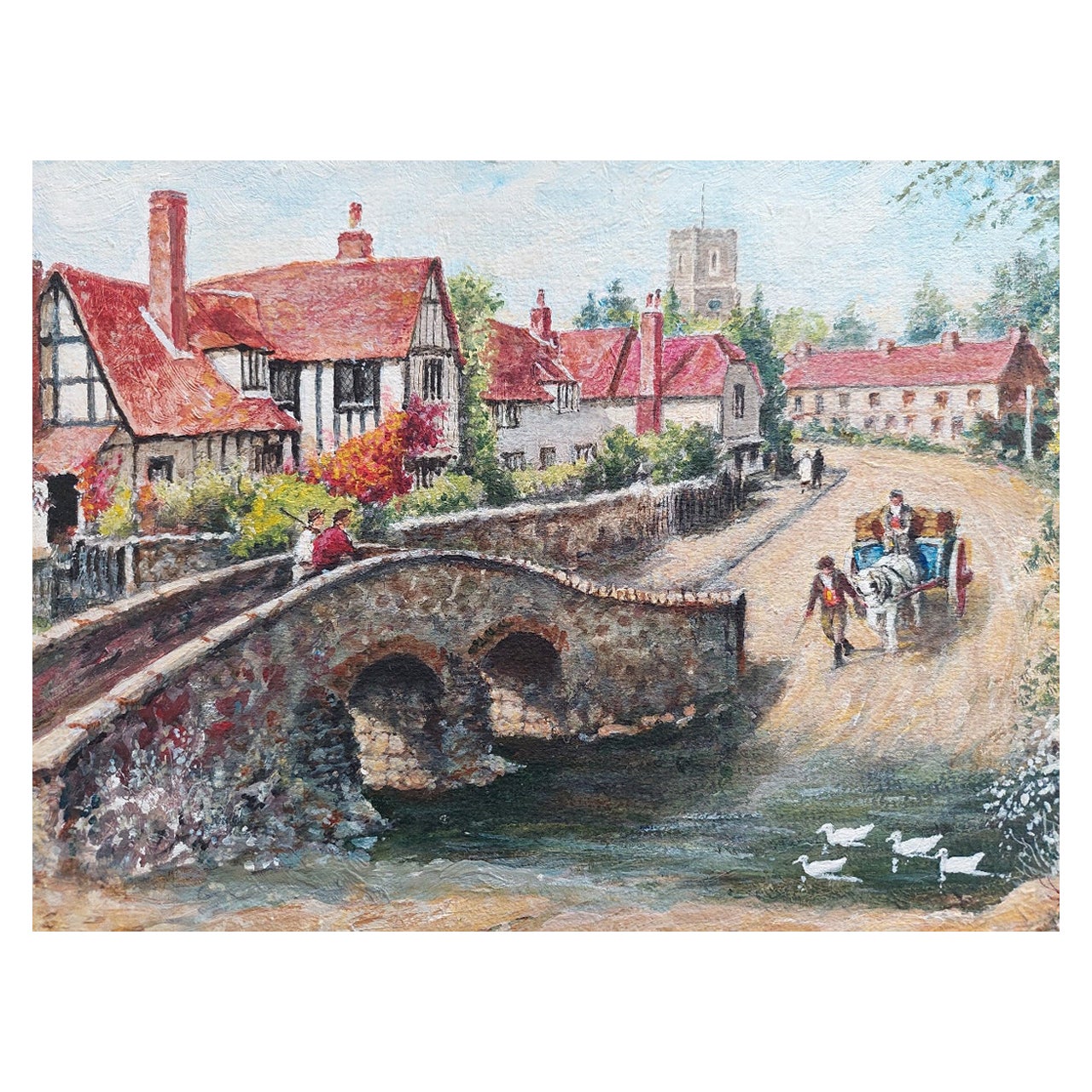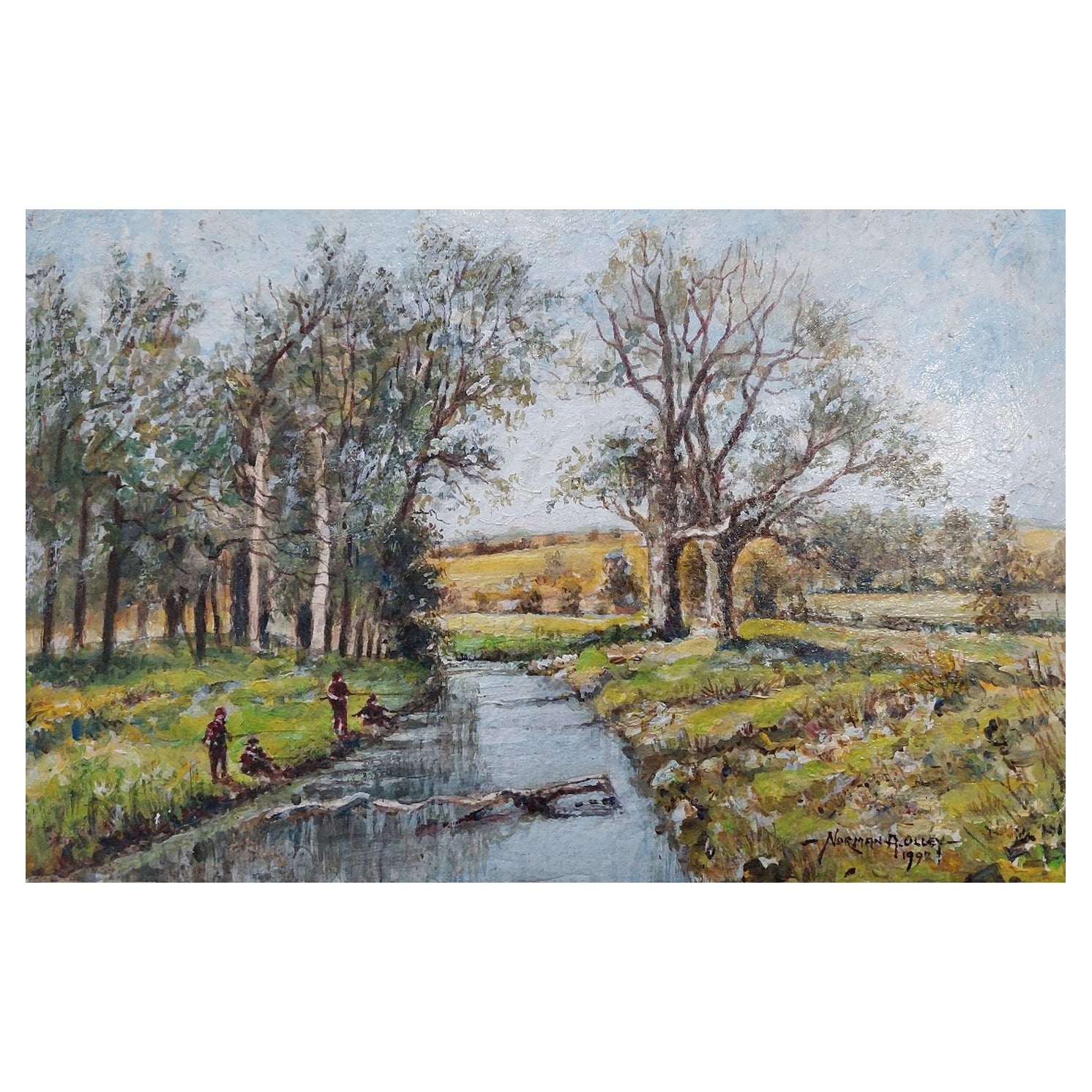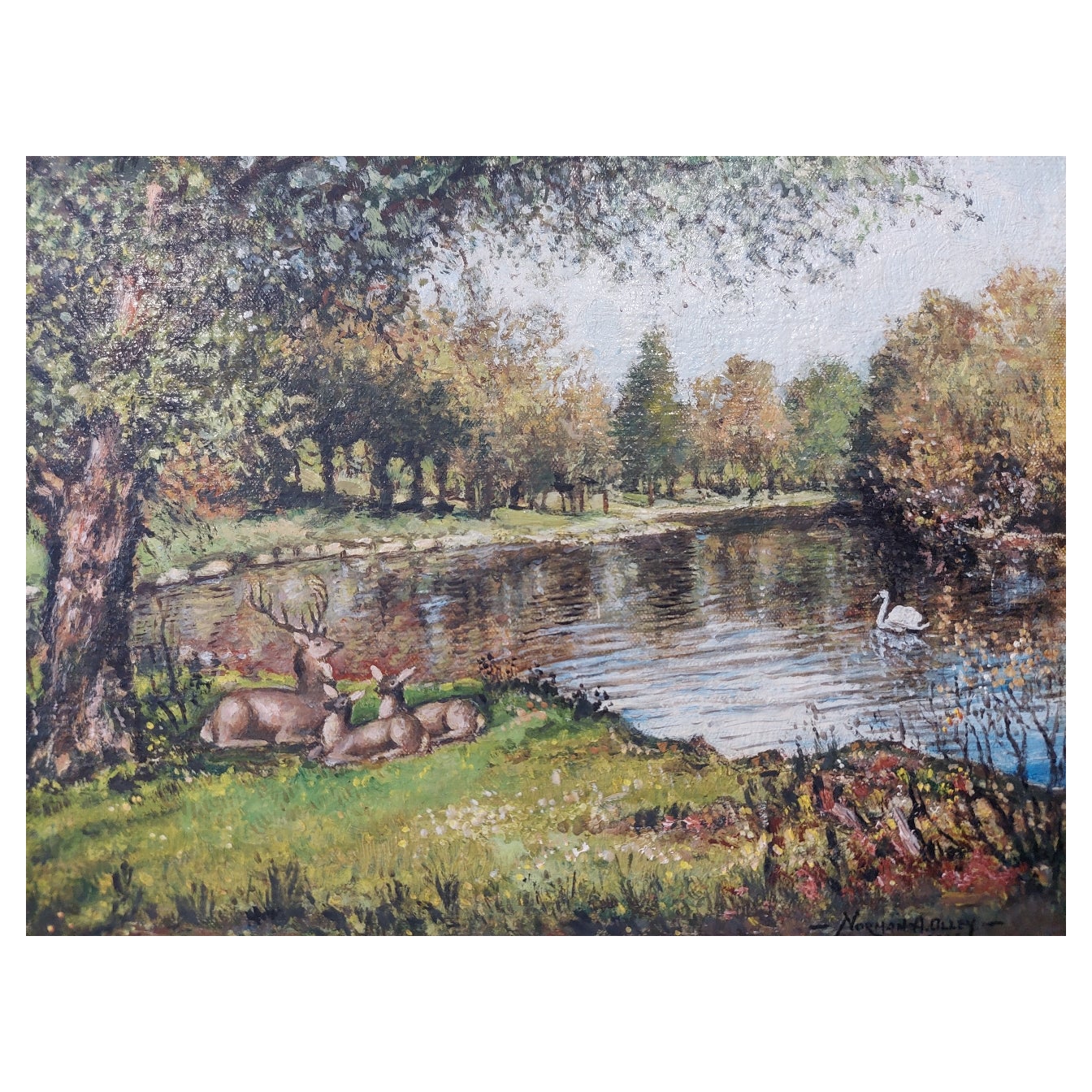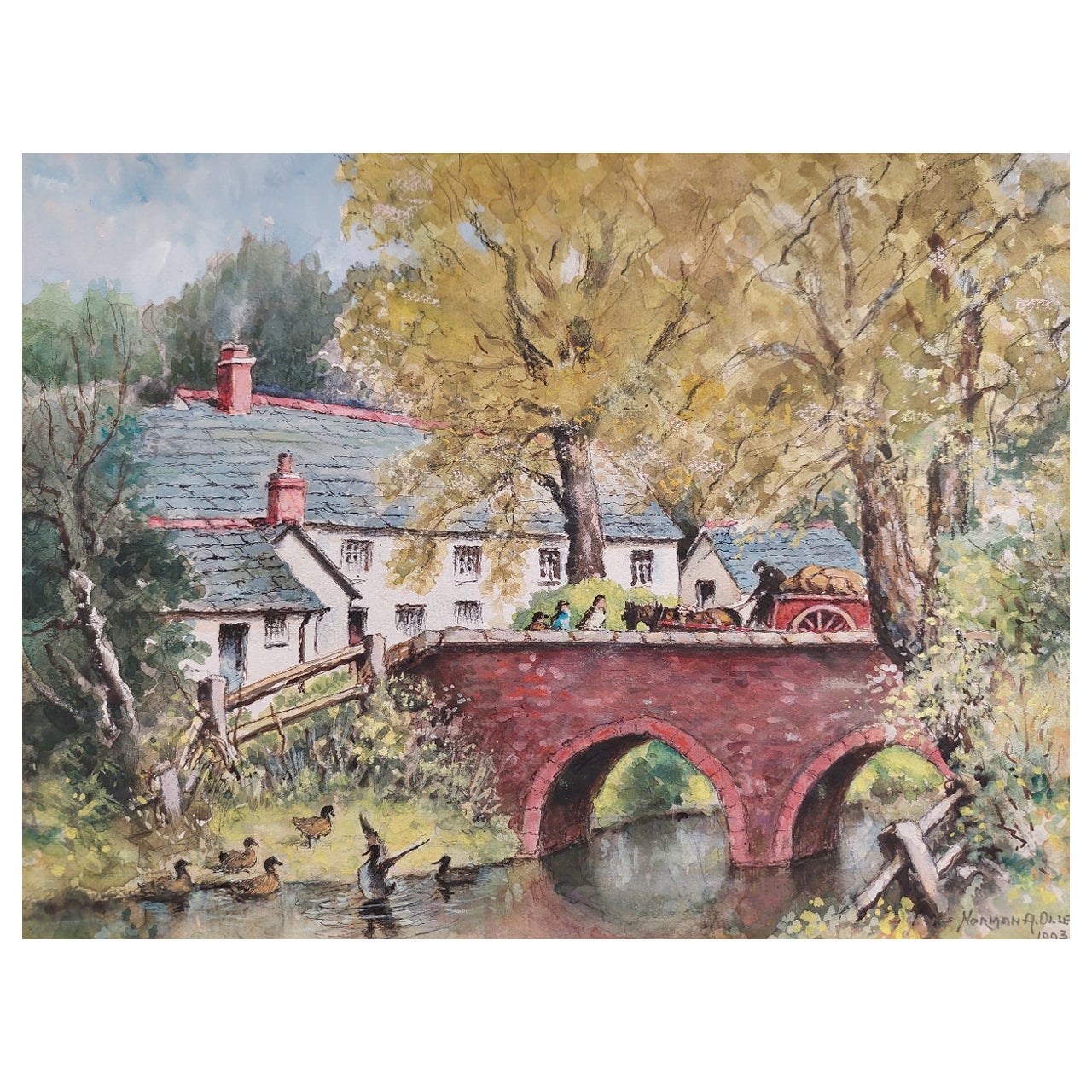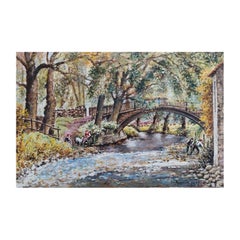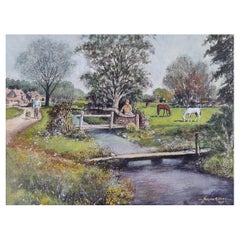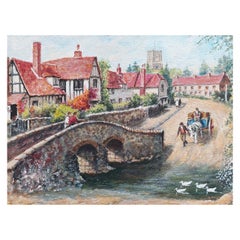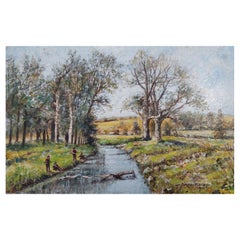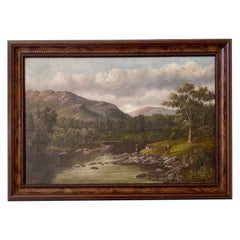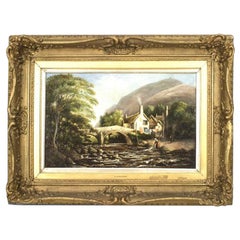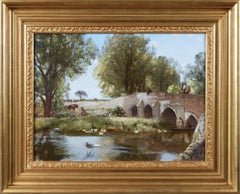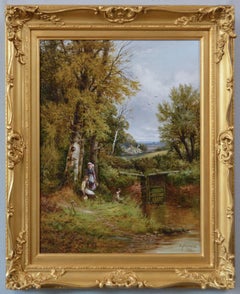Items Similar to Traditional English Painting Huntsman and Dog by a Yorkshire Bridge
Want more images or videos?
Request additional images or videos from the seller
1 of 9
Traditional English Painting Huntsman and Dog by a Yorkshire Bridge
$753.73
£550
€641.66
CA$1,032.42
A$1,148.28
CHF 599.60
MX$13,973.35
NOK 7,657.76
SEK 7,181.63
DKK 4,788.99
Shipping
Retrieving quote...The 1stDibs Promise:
Authenticity Guarantee,
Money-Back Guarantee,
24-Hour Cancellation
About the Item
Artist/ School: Norman A. Olley ( British, 20th Century, 1908-1996), dated 1991, signed to the front
Title - This one has no inscription verso but we feel confident it is another of Norman's Yorkshire scenes. A Huntsman with his gun over his shoulder and accompanied by his dog, walks on a track by an old stone bridge.
Medium: acrylic on board, unframed
Painting : 11.2 x 15.75 inches
Provenance: all the paintings we have by this artist have come from a private UK collection of this artists work.
Condition: The painting is in overall very good and sound condition (minor marks to upper edge of board in sky area).
Artist: Norman Arthur Olley was born in 1908 to a British Army family stationed in Lucknow, Bengal India. His mother died there in 1911, and his father in 1936.
Norman married in Gravesend Kent in 1937, and at the beginning of the war in 1939 he was an aircraft sheet metal worker.
He and his wife to Surrey in the late 1940's -early 1950's where he was a long term member of the Thames Valley Arts Club and where he regularly exhibited his work. In 1951 his painting "View from Richmond Park" was held in high regard at a very well attended exhibition in Esher, Surrey.
The East Molesey area was one of his favourite areas to paint, a 1953 Art Club report showed he had completed what was thought to be the only painting of the old cricket pavilion there and included the figure of a famous local dog "Pat" who had retrieved over five hundred cricket balls from the Thames.
In October 1954 he exhibited alongside work by Terence Cuneo who lived very close by to Norman. Norman was "well known in artistic circles" and a prolific painter of traditional English pastoral scenes with figures, and often with a dog in the scene.
He passed away in Chatham, Kent in the summer of 1996, after returning to the county by 1961.
- Creator:English School (Artist)
- Dimensions:Height: 11.2 in (28.45 cm)Width: 15.75 in (40.01 cm)Depth: 1 in (2.54 cm)
- Materials and Techniques:
- Place of Origin:
- Period:
- Date of Manufacture:20th Century
- Condition:minor marks to upper edge of board in sky area.
- Seller Location:Cirencester, GB
- Reference Number:1stDibs: LU6472231715952
About the Seller
5.0
Vetted Professional Seller
Every seller passes strict standards for authenticity and reliability
Established in 2022
1stDibs seller since 2022
44 sales on 1stDibs
Typical response time: A week
- ShippingRetrieving quote...Shipping from: Cirencester, United Kingdom
- Return Policy
Authenticity Guarantee
In the unlikely event there’s an issue with an item’s authenticity, contact us within 1 year for a full refund. DetailsMoney-Back Guarantee
If your item is not as described, is damaged in transit, or does not arrive, contact us within 7 days for a full refund. Details24-Hour Cancellation
You have a 24-hour grace period in which to reconsider your purchase, with no questions asked.Vetted Professional Sellers
Our world-class sellers must adhere to strict standards for service and quality, maintaining the integrity of our listings.Price-Match Guarantee
If you find that a seller listed the same item for a lower price elsewhere, we’ll match it.Trusted Global Delivery
Our best-in-class carrier network provides specialized shipping options worldwide, including custom delivery.More From This Seller
View AllTraditional English Painting River Workers, Beckford Bridge Bingley Yorkshire
By English School
Located in Cirencester, GB
Artist/ School: Norman A. Olley ( British, 20th Century, 1908-1996), dated 1991, signed to the front and inscribed verso
Title - Beckford Bridge near Bingley Yorkshire. Two men work...
Category
Late 20th Century English Paintings
Materials
Other
Traditional English Painting of a Village Scene with Figures, Dog and Horses
By English School
Located in Cirencester, GB
Artist/ School: Norman A. Olley ( British, 20th Century, 1908-1996), 1995, signed to the front and inscribed verso
Title - "Springtime Rendezvous by a Murmuring Stream". Charming image of a village lane with a figure walking his dog, and another relaxing on the stone wall watching...
Category
Late 20th Century English Paintings
Materials
Other
Traditional English Painting Country Village Pack Horse Bridge Crossing River
By English School
Located in Cirencester, GB
Artist/ School: Norman A. Olley ( British, 20th Century, 1908-1996), dated 1992, signed to the front and inscribed verso
Title - Country Village and Pack Horse Bridge, and Ford by...
Category
Late 20th Century English Victorian Paintings
Materials
Other
Traditional English Painting Boys Fishing near Upnor in Kent
By English School
Located in Cirencester, GB
Artist/ School: Norman A. Olley ( British, 20th Century, 1908-1996), 1992, signed to the front and inscribed verso
Title - Boys Fishing a Stream near Upnor in Kent. Lovely pastora...
Category
Late 20th Century English Paintings
Materials
Other
Traditional English Painting Deer by a River in English Parkland
By English School
Located in Cirencester, GB
Artist/ School: Norman A. Olley ( British, 20th Century, 1908-1996), 1991, signed to the front and inscribed verso
Title - "Woodland Felicity" A pastoral scene of English parkland with deer resting on grass alongside a river, and a swan paddling close by.
Medium: oil on canvas laid to board, unframed
Painting : 9.75 x 8 inches
Provenance: all the paintings we have by this artist have come from a private UK collection of this artists work.
Condition: The painting is in overall very good and sound condition, please note the upper edge and left edge of the board are not cut quite straight. This would be disguised when framed.
Artist: Norman Arthur Olley was born in 1908 to a British Army family stationed in Lucknow, Bengal India. His mother died there in 1911, and his father in 1936.
Norman married in Gravesend Kent in 1937, and at the beginning of the war in 1939 he was an aircraft sheet metal worker.
He and his wife to Surrey in the late 1940's -early 1950's where he was a long term member of the Thames Valley Arts Club and where he regularly exhibited his work. In 1951 his painting "View from Richmond Park" was held in high regard at a very well attended exhibition in Esher, Surrey.
The East Molesey area was one of his favourite areas to paint, a 1953 Art...
Category
Late 20th Century English Paintings
Materials
Other
20th Century Traditional English Painting Derrington Mill Holsworthy Devon
By English School
Located in Cirencester, GB
Artist/ School: Norman A. Olley ( British, 20th Century, 1908-1996), 1993, signed to the front and inscribed verso
Title - "Derrington Mill, Holsworthy, Devon", a detailed and delightful scene of a West Country village bridge...
Category
Late 20th Century English Paintings
Materials
Other
You May Also Like
Welsh River Landscape with Fly Fisherman, by S. Thompson, 19th Century
Located in Nantucket, MA
Antique Welsh River landscape with Fly Fisherman, by S. Thompson, 19th century, entitled "View Near Stamdrinidad sic South Wales," an English School folk...
Category
Antique Late 19th Century Welsh Folk Art Paintings
Materials
Canvas
English Victorian Landscape of Lady in a Creek
By Vincent
Located in Queens, NY
English Victorian gilt framed oil landscape painting of lady bathing on rocky creek near bridge. (signed VINCENT)
Category
Antique Late 19th Century British Victorian Paintings
Materials
Paint
19th Century landscape oil painting of a bridge over a river
By Sir David Murray
Located in Nr Broadway, Worcestershire
Sir David Murray
Scottish, (1849-1933)
The Bridge
Oil on canvas, signed & further inscribed verso
Image size: 17.75 inches x 23.75 inches
Size including frame: 26.25 inches x 32.25 ...
Category
19th Century Victorian Landscape Paintings
Materials
Canvas, Oil
19th Century landscape oil painting of figures fishing by a river lock
By Robert John Hammond
Located in Nr Broadway, Worcestershire
Robert John Hammond
British, (1853-1911)
Fishing by the Lock Gate
Oil on canvas, signed & dated 1893
Image size: 19.5 inches x 14.5 inches
Size including frame: 25.75 inches x 20.75 inches
A picturesque painting by Robert John Hammond of three figures next to a river lock. One of the figures can be seen fishing on the bank as the others take shade under the trees.
Robert John Hammond was a landscape painter born in Blackfriars, London in 1853. By the time he was 18 he had moved to Sutton Coldfield where he initially became an apprentice watchmaker before becoming a full time artist. In 1871, he married Lucy Banner, the sister of the artist Alfred Banner...
Category
19th Century Victorian Landscape Paintings
Materials
Canvas, Oil
Lancaster Bridge Original Oil Painting
Located in Annville, PA
A very interesting and unusual Lancaster Bridge Original Oil Painting by artist J. Earle Pfoutz. The painting is produced on artist board and comes complete with what appears to be an original artist decorated/painted frame. The painting is signed on the front by the artist.
Overall frame Size approximately 42″ wide x 2″ deep x 30″ high
J. Earle Pfoutz had a long and distinguished career as a self trained artist. More can be learned about him from reading this article produced by Gary Hawbaker at askART
Earle Pfoutz Born: 1891 – Lancaster, Pennsylvania
Died: 1957
Known for: Landscape, figure, still life painting
An image of J Earle Pfoutz
Biography from the Archives of askART
J. Earle Pfoutz (John Earle Pfoutz) – (Oct 23, 1891-Nov 9, 1957)
“A seventh generation descendant of a Swiss family which arrived in America early in the 17th Century, J. Earle Pfoutz was born in Lancaster, PA, son of John Bachman and Susan Allison Pfoutz. He painted houses for a living and pictures for a life.
A self-taught artist, described as a primitive, he was distinctive for his vivid imagination and bold color application. He painted hundreds of Lancaster County scenes. Pfoutz traveled through the hills near his home and along the Susquehanna River in search of scenes. He began painting with a brush when he was fourteen, but added a palette knife after suffering an eye injury. He completed eighth grade in the Lancaster Public Schools and there his formal education ended. However, the Department of Public Instruction of the State of Pennsylvania thought so highly of his work as an artist that officials certified him as an art instructor and he taught for a year in the York (PA) public schools. He also was an art instructor under the program for disabled veterans, sponsored by the Veterans Administration, when he gave private instruction to veterans in their homes.
In 1947, J. Earle Pfoutz finally earned national recognition as an artist. His painting, Opalescent October, was chosen by the Museum of Art of Dayton Ohio, to travel all over the country for a year with its Group Exhibition. Described as a “very colorful, calm scene, iridescent in color, sweeping in design,” the painting started on its journey around the country early in 1948. In an interview with the Sunday News (Lancaster, PA – Nov 2, 1947), Pfoutz stated that he didn’t know whether he was a “primitive” or an “impressionist.” No master taught him, no school channeled his style. “Sometimes I didn’t eat, but I always managed to paint,” he recalled. Many of his hundreds of canvases -most of them not sold, but given away to friends – found their way to other parts of the country. “I never remember the day when I did not love color,” Pfoutz said. “I was about 12 years old when I saw my first palette – a string of different colored paint paddles that graced the stores of that day. As a boy I had two great desires. One was to be able to eat all the strawberry jam I could, and the other to possess a string of those beautiful paint paddles. Well, I’ve got my fill of jelly, but I’ve never yet got my fill of beautiful colors.”
In 1950, Pfoutz’s one man show of paintings made front page headlines in the Lancaster Intelligencer Journal: “Most of the twenty oil paintings on exhibition are landscapes, although there are several interesting figure studies. Colors again, as in all Pfoutziana are rich and full-bodied, but for the most part not as startlingly as in some of the earlier work. Most of the paintings were done during the past year, and also reveal the painter’s characteristic heavy impasto technique, in which the rich swirls of paint carry their own message. Among the figures, The Banjo Picker, and The Magician, are the most provocative. Both are character studies; the first being of a tramp musician whose drab clothing is set-off by a luminous aqua blue background. Modern in feeling and treatment is The Magician, a clown-faced wizard whose spinning ball in the air suggests the fourth dimension – space. The use of the primary colors in this picture serves to emphasize the theme effectively.
A large colorful landscape, Opalescent October, depicting rolling hills against a late afternoon sky is new to Lancastrians, as it has just returned from Dayton, Ohio, where it hung in the Dayton Art Institute. Another landscape with soft dreamy colors is Fantasie D’Autumne, and one of the loveliest pictures in the show. Pennsylvania Dutch Country is another with eye appeal, and was one of the works which was hung in the Old Customs House in Philadelphia during Pennsylvania Week, and before that in a collection of Pfoutz work in the same place. In deep contrast to the sunny skies and brilliant foliage of many of the pictures, is the somewhat morbid Worry, in which the center of interest is a tremendous rat. This, the painter explains, was symbolic of 1948 in China, which was ‘The Year of The Rat’ in the Chinese calendar. Background material for the picture was furnished to Pfoutz by author Pearl Buck.
Other pictures include Autumn Prelude, Miners Village, painted at Cornwall, PA; Humid Day, Saint Peters Kierch, at Middletown, PA; Lady Pfoutz, inspired by the painter’s wife; Sun Flowers, Sentimental Journey, Gyne, Luzon Woman, Old Bridge, The Cow Path. Lemures, based on Roman mythology, and Ethiopian, painted from an ebony wood carving from Kenya Province, S. Africa.”
In 1953, Pfoutz was installed as President of the Lancaster County Art Association. A. Z. Kruse, New York City artist, writer and member of the faculty of the Brooklyn College and the Cartoonists and Illustrators School, Manhattan, was the guest speaker. In January of 1953, thirty-five Pfoutz oils were exhibited at the Old Custom House in Philadelphia, PA under the sponsorship of the Carl Schurz Memorial Foundation. Several Lancaster County landscapes and covered bridges were included as well as Katy, a Pennsylvania Dutch scene. Symbolic paintings included End of the Second Day, the artist’s visualization of the second coming of Christ, and Twilight, typifying the grief of mothers of all lands for sons lost in battle.
In June of 1953, a Pfoutz oil made history in Lancaster. From the Lancaster New Era: “For the first in local art history, a painting has been withdrawn from an exhibition because of objections from viewers and hostesses serving at the show. The painting, Jeune Fille, a standing nude done by Pfoutz, was one of the paintings in the annual spring exhibition of the Art Association and had become the center of the controversy. Pfoutz said he took the painting down… ‘graciously but reluctantly.’ ‘From an artistic standpoint, there is nothing offensive about the painting,’ Pfoutz said. ‘This community just wants its nudes with clothes on.’ “It is most brilliant in color, and because it is so brilliant I thought it would make a nice lively spot for the show. This is the first time I’ve had to take a picture off the walls. I substituted a seascape for it.’ Pfoutz said he felt the painting brought a lot of viewers to the show because it was so controversial. It had never been exhibited before. ‘If this had been shown in a metropolitan city,’ he commented, ‘people wouldn’t have given it a second glance. But the viewpoint here is more conservative, even though I don’t think moderns would have minded.’ He said he felt the painting was neither ‘objectionable nor pornographic,’ but had complied with the wishes of fellow members of the Art Association who telephoned him to relay the protests they had received. The art controversy was the first to arise here publicly since the showing of Amish Grandmother, an oil by William Gropper which was part of the Gimbel Pennsylvania exhibit at the Griest Building several years ago. — Numerous viewers of Amish Grandmother, [a painting showing an Amish woman holding a white goose], expressed themselves quite vocally, calling it an affront to the Plain Folk. But it stayed on exhibit throughout the length of the Gimbel show. Pfoutz expressed no rancor, implying that if Gropper could take it so could he.”
After his death, there were several shows of Pfoutz’ work organized by his son J. Earle, Jr. J. Earle, Jr. also saw to it that President Eisenhower would receive an oil called The Cow’s Path. The president first saw the painting in 1950 when, as president of Columbia University, he visited Lancaster to address a student assembly at Franklin and Marshall College. After his address was over, the then Gen. Eisenhower stopped at the Fackenthal Library on the campus to view an exhibition of Pfoutz’s paintings. The Cow’s Path intrigued him. For some time, as his aides fumed to get him back on his time schedule, Eisenhower and Pfoutz talked, as artist to artist. Prior to his death, Pfoutz requested that The Cow’s Path be given to the President if he wanted it. The painting was presented to Ike at the White House in November of 1959. Mrs. Eisenhower owned a Pfoutz painting titled, In the Manor.
Though house painting was his livelihood, he worked for Millersville State Teachers College (now a university) for a time during World War II, and called himself “the Chimney Sweep of MSTC.” During that period he knocked out a dizzying canvas in the surrealist style (he thought it was terrible) and got into the campus newspaper when one of the students spotted it.
Earle Pfoutz was not the humble, downtrodden artist, not the Douanier Rousseau type at all. As he developed his skill and style through the years, he also fashioned a resilient confidence in himself as an artist. Whether he was building his own home (he built two) or painting one for somebody else, he never lost faith in his ultimate recognition—though he was never sure he would live to see it.
Whether he was working as a rigger for a hoisting company, in the Stehli Silk Mill of Lancaster, carving Cloister-style chairs, decorating old chests, cementing bricks from the old Safe...
Category
Vintage 1940s American Paintings
Materials
Paint
Fishermen on a River - Mid 20th Century French Naif Landscape Oil Painting
By André Bouquet
Located in Sevenoaks, GB
A beautiful mid 20th century French naif oil on canvas depicting two men fishing on a river by André Bouquet. The artist is featured in Anatole Jakovsky's ''Peintres Naifs'' which is known as the bible of 20th century naif painters.
The work is signed lower left and presented in it's original gallery frame.
Artist: André Bouquet (French, 1897-1987)
Title: Fishermen on a River
Medium: Oil on canvas
Size: 16.5 x 19.5 inches (42 x 50 cm) including the frame
André Bouquet was a butcher by trade, who had his stall in open air markets. In order to have more time to paint, however, he became a factory cook and later a foreman in the same factory.
He lived only for his painting, which once he stopped working he did every day of the week, including Sundays. He is a sensitive and delicate artist, especially when depicting Parisian suburbs, of which he has caught the atmosphere remarkably. He also painted numerous snow landscapes.
Source: Anatole Jakovsky - Peintres Naifs - Paris 1956
Category
Mid-20th Century Landscape Paintings
Materials
Canvas, Oil
More Ways To Browse
Mark English
Retro School Furniture
Old English Furniture
Old School Furniture
English Pastoral
Folk Art Dog
Used Furniture Surrey
Richmond Vintage Furniture
Vintage Metal Aircraft
Used Furniture Chatham
Hector Leonardi
John Swatsley
Kittie Bruneau
Marcel Wibault
Maurice Dupras
Omar Chkhaidze
Rene Bokoko
Rene Sinicki
